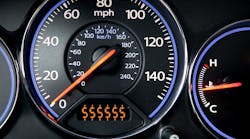Sen. John Cornyn (R-Texas) put the trucking industry back on the chopping block with a truck-only tax increase of 25 cents per mile traveled to support infrastructure funding.
“A targeted vehicle-miles-traveled user fee on heavy trucks used in commercial vehicles, along with perhaps some relief on other fees that the trucking industry pays, to me seems like one idea that — while there’s no perfect idea, and there’s also nothing free — we need to come up with something that makes sense,” Cornyn said during a May 18 Senate Finance Committee hearing. “That’s something I appreciate the committee considering.”
Industry leaders are pushing back in defense of the truck drivers who have worked tirelessly throughout the COVID-19 pandemic to ensure the economy stays intact, claiming that Cornyn’s vehicle miles traveled (VMT) tax proposal exclusive to truck drivers is “mind-boggling” and “unbelievable.”
Chris Spear, president and CEO of the American Trucking Associations (ATA) called out the senator for wanting “to tax the central and most critical link in the supply chain as the economy tries to climb out of the COVID recession.” He added that a VMT tax could have "disastrous consequences for our economy, killing good-paying trucking jobs across the county while hitting consumers hard with higher prices for gas, food, medicine, and everything else they use and depend on their daily lives."
Spear added that "if Senator Cornyn was looking to throw a wrench in our recovery at the worst possible moment, he found the right policy with his Cornyn Tax.”
According to Cornyn, “big trucks do six times more damage to roads and bridges than private vehicles.”
In March, ATA clarified that a VMT tax program will be based on road use, not road mileage. The result is that urban roadways will generate far more revenue than rural systems–although rural roads possess far more miles and provide strategic connectivity between those urban hubs.
The Owner-Operator Independent Driver Association (OOIDA) President and CEO Todd Spencer drafted a letter to Ron Wyden, chairman, and Mike Crapo, ranking member, of the Committee on Finance outlining his concerns over the impact of a VMT tax.
“Truckers already pay more than their fair share into the Highway Trust Fund (HTF) and any VMT system must not single out truckers,” Spencer said. “Not only is our industry currently paying more than its fair share, a report by the Congressional Budget Office found HTF revenues derived from motor carriers through the heavy-vehicle and tire taxes will increase from 2019 to 2029. Between the current diesel tax and these supplemental taxes that other highway users do not pay, the trucking industry is estimated to increase its contributions to the HTF over the same period of time.”
Spencer also noted that implementing a truck-only VMT is also nowhere near as simple as some proponents have claimed.
“Current law prohibits the use of electronic logging devices (ELDs) for anything other than monitoring hours of service,” Spencer pointed out. “Furthermore, many trucks are not required to use ELDs because of either industry or operational exemptions–some put in place by Congress. To implement a truck-only VMT, Congress would need to dramatically increase the mandated use and scope of ELDs.”
Back in March, The American Transportation Research Institute (ATRI) released a new report detailing the costs of deploying and operating a tax on national VMT and was identified as a top research priority by ATRI’s Research Advisory Committee in 2020.
ATRI determined that replacing the federal fuel tax with a VMT tax that is assessed on 272 million private vehicles could result in collection costs of more than $20 billion annually — or 300 times higher than the federal fuel tax.
“Truckers are not rolling piggy banks; they are hard-working men and women trying to make a living,” Spencer said. “After a year of working throughout the pandemic to keep critical supplies moving, it is unbelievable that the senator would single out truckers to address the funding shortfalls created by Congress' inaction. An increase in fuel tax would be an efficient means of raising funds, provided the dollars only go to roads and bridges.”




